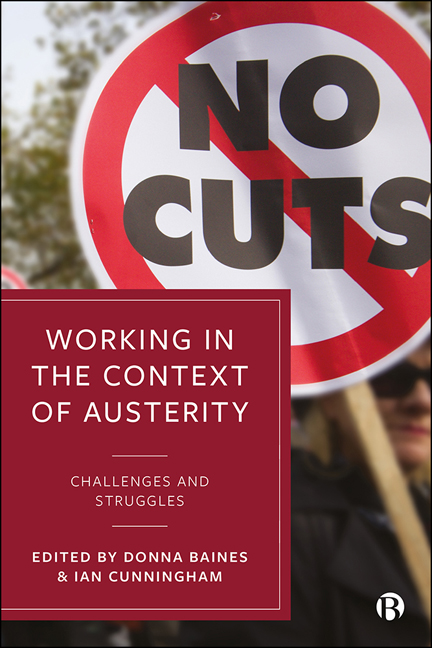11 - Austerity and the Irish Non-Profit Voluntary and Community Sector
Published online by Cambridge University Press: 18 March 2021
Summary
Introduction
Ireland stands as one of the countries most severely affected by the Great Recession (GR) and the Global Financial Crisis (GFC), which necessitated unprecedented remedial measures in the form of a ‘bail out’ by the three international institutions known collectively as the Troika (International Monetary Fund, the European Central Bank and the European Commission), through promulgation of emergency legislation and the adoption of severe austerity measures (Robbins and Lapsley, 2014). Such interventions impacted on all sectors, including the social economy, with the Irish Non-Profit Voluntary and Community Sector (NPVCS) being forced to do more with less, which had implications for how it did its work and managed its people.
This contribution illustrates one of the themes of this volume's Chapter 1 on how austerity may be framed. In this case, austerity may be interpreted either as a continuation of an established neoliberal ideology or as a not-to-be-wasted opportunity that is unique to a particular era in time (Pierson, 1998; Clarke and Newman, 2012). The economic success of the Irish economy from 1994–2007, better known as the ‘Celtic Tiger’, was in stark and sudden contrast to the recessionary-fuelled era of 2008 to 2016, in which austerity dominated (Murphy, 2014). This unprecedented period in Irish socioeconomic history placed intense financial pressures on all sectors of the Irish economy as government spending and revenues drastically contracted and taxation increased (Roche et al, 2017). The NPVCS was not immune, given it high dependency on state funding and its close relationship with government in terms of governance, regulation and service contracts.
To provide insight into the dynamics of austerity in the Irish NPVCS context, this chapter draws on a qualitative-based empirical study within the subsector of Physical and Sensory Disabilities (PSD), built around two principal service providers, anonymized as Alpha and Omega. It argues that government funding and service-level agreements (SLAs) created the conduit for New Public Management-(NPM) orientated thinking and practices to enter the sector and exert downward pressures on how it manages people and work. Coincidentally, this conveniently aligned with austerity ideology and gave new impetus to NPM. The findings show strong evidence of NPM-orientated changes in work and human resources management (HRM), propelled by strong isomorphic pressures that had accelerated and intensified during the era of austerity.
- Type
- Chapter
- Information
- Working in the Context of AusterityChallenges and Struggles, pp. 217 - 236Publisher: Bristol University PressPrint publication year: 2020



